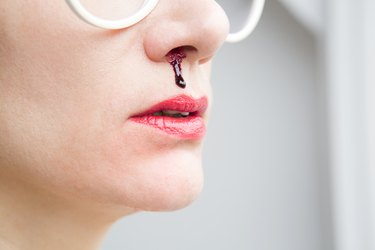
Nosebleeds are an almost inevitable part of life. Approximately 60 percent of people will have at least one nosebleed during their life, according to an article published in "Australian Family Physician" in September 2015.
Most nosebleeds occur near the front of the nose and stop on their own. Dry air, picking or blowing the nose and having a cold are among the most common causes. Less common causes include high blood pressure or bleeding disorders.
Video of the Day
Video of the Day
The relationship between vitamin D and nosebleeds is currently unclear. However, a small amount of scientific evidence suggests that both too little and too much vitamin D may increase the likelihood of a nosebleed.
Vitamin D Deficiency
Vitamin D plays an important role in maintaining strong bones and healthy immune and cardiovascular systems. A review article in the January 2018 issue of "The Journal of Steroid Biochemistry and Molecular Biology" noted that low vitamin D levels increase the risk of developing a number of conditions, including infections, high blood pressure, heart disease, type 2 diabetes, osteoporosis, some cancers and certain autoimmune diseases like multiple sclerosis.
Vitamin D Deficiency and Nosebleeds
Because vitamin D deficiency increases the chances of developing a cold or high blood pressure, one might expect that it would increase the likelihood of a nosebleed.
Only one published study has examined whether this is true. That study, published in the "International Journal of Pediatric Otorhinolaryngology" in October 2016, compared 42 children with nosebleeds to 55 children without nosebleeds. The results showed that vitamin D levels on average were significantly lower in children with nosebleeds. A below-normal vitamin D level increased the likelihood of a nosebleed by about 14 percent.
Excess Vitamin D
Too much vitamin D may produce side effects. As vitamin D increases the absorption of calcium from the digestive tract, the main side effects are related to too much calcium in the body. These include nausea, vomiting, kidney stones, pancreatitis, heart rhythm abnormalities and high blood pressure.
Sun exposure and consumption of vitamin D-rich foods are very unlikely to cause high levels of vitamin D, according to the National Institutes of Health (NIH). However, long-term use of vitamin D supplements above the maximum amounts recommended by the NIH may lead to an excess of vitamin D.
Excess Vitamin D and Nosebleeds
Very limited evidence suggests that excess vitamin D may increase the likelihood of a nosebleed. Laboratory studies have shown that vitamin D can act as a blood thinner, interfering with the body's ability to form blood clots. No studies have directly evaluated whether high vitamin D levels lead to nosebleeds or other types of bleeding in humans.
However, a study of more than 6000 people published in the June 2016 issue of "The Journal of Clinical Endocrinology and Metabolism" found that people with higher vitamin D levels had lower levels of two proteins required for the formation of stable blood clots. Furthermore, because high calcium levels can lead to high blood pressure, excess vitamin D may indirectly increase the likelihood of nosebleeds through its effects on calcium.
Next Steps
Although nosebleeds have many causes that are unrelated to vitamin D, it may be reasonable to have your vitamin D level checked if you have a nosebleed. Definitely see your doctor if you have frequent nosebleeds.
When your nose starts to bleed, pinch your nostrils shut with your fingers and tilt your head slightly forward. Applying an ice pack over your nose may also be helpful. Seek prompt medical attention if you have a nosebleed that does not stop in about 20 minutes. Also seek immediate medical care if the bleeding appears to be coming from deep in the back of your nose, if there is a large amount of blood or if you are vomiting up blood or feeling weak or dizzy.
- Merck Manual Professional Version: Epistaxis
- National Institutes of Health: Vitamin D
- Stat Pearls: Epistaxis (Nose Bleed)
- Australian Family Physician: An Update on Epistaxis.
- Journal of the American Board of Family Medicine: Vitamin D -- An Evidence-Based Review
- International Journal of Pediatric Otorhinolaryngology: Evaluation of Vitamin D Levels in Children With Primary Epistaxis.
- The Journal of Steroid Biochemistry and Molecular Biology: Non-musculoskeletal Effects of Vitamin D
- The Journal of Clinical Endocrinology and Metabolism: Associations of Serum 25-Hydroxyvitamin D With Hemostatic and Inflammatory Biomarkers in the Multi-Ethnic Study of Atherosclerosis